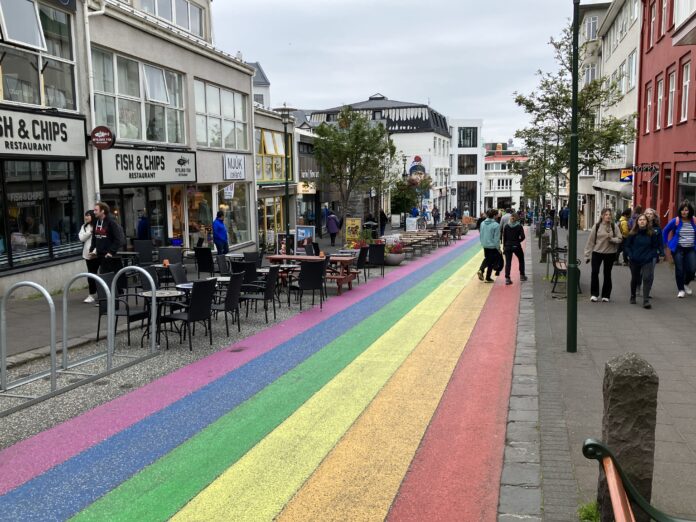When compiling a list of the most LGBTQ-friendly countries in the world, Iceland is always among the top in every metric, including supportive legislation, general friendliness and safety. The country had the first LGBTQ+ person head a government, when Jóhanna Sigurðardóttir became Prime Minister in 2009. It banned conversion therapy this past June. And the Reykjavik Pride celebration draws upwards of 100-thousand people, which is one-third of the country’s entire population. For such a small country, Iceland is making big news in the LGBTQ community worldwide. It makes one wonder: What makes it such an inclusive place?
I recently attended an event in Reykjavik with LGBTQ+ locals. It was a talk on Stonewall followed by a chance to mingle with one another. When I spoke with locals, they took a quick interest in my life. What did I do for work? Did I like it? What did I notice about Iceland that stuck out to me? What did I like to do in my spare time? Where could they read some of my writing? The ease at which people asked me these questions, and the eagerness they seemed to have to learn my story, stuck out to me. I’ve never been to a country where learning about others seemed so natural to people.
Among the attendees at the event were two playwrights. One had written a play about HIV/AIDS in the ’90s, and it was many people’s first introduction to the LGBTQ+ community. The play sparked many conversations, something that all good art should do. The other person wrote a play about him being the first person to come out in his western Iceland village. His play ran in Reykjavik, and then he was given money by the government to take the play around the country to various schools. His story was seen across the country, and again, it led to conversations about coming out and LGBTQ+ acceptance.
This attention to storytelling is something that is ingrained in all Icelandic people. The country has what’s called Sagas, which are stories about historical events and people. They showcase how people lived and worked with each other. They don’t shy away from violence, or sadness or despair, but they also don’t shy away from joy. They simply try to evoke life as it was lived. One person told me that the Sagas are what the country is based on, similar to how the Declaration of Independence is what America is based on.
It was an enlightening experience, getting to meet people from a country founded on storytelling that places an importance on sharing stories. And it quickly led me to realize that the reason Iceland is so LGBTQ-inclusive is because the country, as shown throughout its history, teaches people to value the stories of others. As I learned from the meet and greet, Icelanders actively want to learn about other people. They understand that everyone has a story, and they know how to both listen and to ask questions to get the full picture. In a nutshell, Icelanders have been taught not just how to understand others, but also the value in gaining that understanding. Learning about others makes one’s own life richer.
To build an inclusive community, people must be taught to be open to other people’s stories. Take an active interest in where others come from, and never forget that everyone’s story is different and everyone’s story is important. While it’s easy when you’ve been taught that since elementary school, it’s also not that difficult to teach an adult. When you listen to people’s stories and find the similarities and differences to your own, it builds empathy. And that empathy is the backbone of inclusivity.
While Iceland is not without its problems, including a small minority of vocal transphobes, it’s leagues ahead of countries like the U.S. when it comes to LGBTQ+ rights. And that’s because their people aren’t afraid to learn about others. They actively ask about people’s lives, and they understand that everyone has a different story and nobody has the best story. There are many different ways to live a good life. And just as you can’t change someone’s story, you also shouldn’t change how they live their lives. That’s how Icelanders go about the world. It’s a true lesson for all of us.

